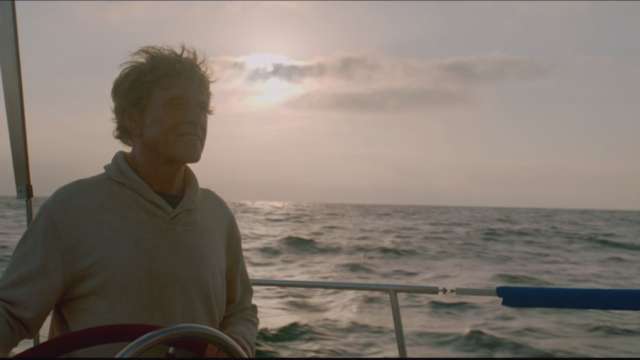“I fought to the end. I’m not sure what that is worth, but know that I did.”
Set in an alternate universe where marine radios aren’t waterproof, All Is Lost begins with a shipping container hitting a boat somewhere in the Indian Ocean. (The opening shot comes from Alien‘s credit sequence, and makes that container the alien presence.) The boat has one man (Robert Redford) on it, and writer/director J. C. Chandor shows us his eight-day struggle to survive, nothing else. It’s comparable to Gravity and The Martian in the sense that’s a purer story than either one: no other people, no backstories, almost no words, just the objective of Stay Alive and the actions to achieve that.
Chandor’s direction defines “simple, not easy.” The camera never gets too far from Redford (Chandor called it the “bungee cord rule”) to create intimacy and immediacy. There’s no aggressive cutting, so we can see Redford’s actions as actions and not as spectacle. Alex Ebert (no relation) provides a mostly great, haunting score, using a repeated five-note Brian Eno-like motive that occasionally blooms into something more. (An uplifting choral piece, late in the movie, is a severe misstep but the only one.) Chandor subtly controls the pace of the film by allowing some actions to play out in their entirety (like opening and closing a hatch) and eliding others with edits (the draining of the boat). He also slowly increases the amount of internal edits from start to finish to drive the tension. Chandor shows the boat in enough detail that you quickly have a sense of what is where and why that matters; the general clutter of it and the possessions say a lot too. (The thematic arc of the story means we see fewer and fewer of those possessions, and that pays off in the final scene.) The boat isn’t a character but a world, and the moment when it sinks is one of All Is Lost‘s most moving.
The simplicity of the direction means that All Is Lost rests on Redford’s performance, and he carries it, thoroughly and movingly. This about as pure as drama can be: action after action after action, each one necessary, with really no time to emote. Redford does everything with care and effort (he can almost never perform an action in a single motion); the former makes it feel like he’s attempting a lot of these things for the first time, the later comes from being 77 years old, and both are nerve-wracking and therefore thrilling to watch. In a world where action movies have gotten more and more dominated by CGI superheroes shifting pixels around, the excitement of watching Redford grabbing supplies out of a flooded boat reminds us of what movies can really do.
Like the set, those actions do so much to tell us who this man is: inexperienced but smart, solitary, a sensualist. You can see, in the deliberateness of what he does, how he has to think through each step; you can also see how actions that look unnecessary to us matter to him. (When he shaves before a storm hits, I was on his side to the end. The Alain Delon of Le Samouraï would have done the exact same thing. You don’t sail into the teeth of Death looking all unattractive.) When he cooks, it’s not his first (or first five thousandth) meal alone; in the few moments when his life isn’t in danger, you know why he sailed off, thousands of miles away from anybody: because that’s exactly where he wants to be. (In my backstory, he’s been sailing for only a few years, and this was the last thing on his bucket list.) Redford never indicates anything, it’s all in what he does and how he does it.
Great acting makes us see all this, but there’s no denying part of why I care is because it’s Robert Fucking Redford doing it. He’s past the Youth of All the President’s Men and Butch Cassidy and the Sundance Kid, past the Man of Up Close and Personal and Sneakers, and he’s now literally the Old Man (and the Sea). The energy he brought to the first period is mostly gone, the weight of the second period has become a kind of sorrow, but it’s recognizably the same person. Again, stars carry a persona with them into every role, and a distance was always part of Redford’s. Writing on one of his Youth movies, Three Days of the Condor, our own ZoëZ described Redford as “aspirational, not relatable,” and part of the power of All Is Lost is that for maybe the only time in his career, he’s both, the version of Redford that could be one of us.
Tense and economical for most of its runtime, All Is Lost takes a leap in its final scene, fulfilling the promise of Redford’s opening (and only) monologue, strictly playing by the rules of drama, and illustrating the words of SairoseRonanTheAccuser, way back at The Dissolve: “a lot of ambiguous endings stem from creators not wanting (or not knowing how) to make a difficult choice, when in reality the ambiguity itself should be that difficult choice.” It’s (possibly literally) sublime.

